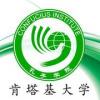Rachel Philbrick was born and raised in Cambridge, Mass., and attended high school at the Commonwealth School, a small, private institution in Boston’s Back Bay. Commonwealth’s small size fostered a stimulating intellectual environment, encouraging interactions between students and faculty. It was here that Rachel first encountered Latin, studying it for four year and travelling, in her junior year, to Italy with her Latin class.
From there, Rachel entered Cornell University as a biology major. In her sophomore year, she added Latin as a second major under the mentorship of Prof. Michael Fontaine and, in May 2007, completed degrees in both Latin and Biology & Society. She spent the summer of 2006 in Rome, Italy, studying at Fr. Reginald Foster’s Aestiva Romae Latinitas, where she encountered a vibrant intellectual community akin to that she had enjoyed in high


















